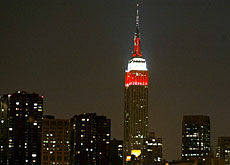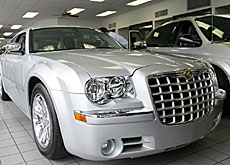Spectre of terrorism haunts Swiss-US relations

Three years after the horrors of September 11, 2001, the events of that day continue to overshadow ties between Switzerland and the Bush administration.
The “war on terror” has led to tighter controls and regulations in Switzerland, affecting not only the banking and export sectors, but also tourists and mobile-phone users.
The past three years of the Bush presidency have seen increased security measures to protect the United States from new attacks – and this is unlikely to change whoever wins the election on November 2.
Since the beginning of the month, all Swiss citizens entering the US have had their fingerprints and photograph taken.
To comply with State Department requirements, Switzerland says it will also start issuing biometric passports containing face recognition data from the end of next year.
Even obtaining a visa for the US has become an increasingly difficult process.
“Three people I invited to the US to participate in a discussion turned down the invitation because they did not want to comply with the various demands imposed by the authorities for obtaining a visa,” Katharina Vogeli, director of the Swiss Foundation for World Affairs, told swissinfo.
This institution, based in Washington and financed largely by the private sector, has organised meetings and conferences in the US capital to promote an exchange of ideas and points of view between Switzerland and the US.
Fight against terror
But differences of opinion in some quarters have not posed an obstacle to strengthening links between the two countries, especially in the fight against terrorism.
An “Operative Working Arrangement” was signed between the two countries in September 2002, enabling Swiss and US investigators to cooperate more closely.
The tracking of Swiss prepaid mobile phones used by al-Qaeda members has resulted in several high-profile arrests, including that of Khalid Sheikh Mohammed and other operatives suspected of involvement in the September 11 attacks.
The Swiss authorities are now closing the loophole that allowed customers to buy prepaid phones without registering their details.
Finance sector
The introduction of tougher regulations in Switzerland’s financial sector is another legacy of September 11 and the fight against terrorism.
The Swiss have been praised on a number of occasions by the Bush administration for their pivotal role at the forefront of international efforts to stop the funding of terrorism.
As of last month, the economics ministry said it had frozen 82 bank accounts suspected of links to Osama bin Laden, al-Qaeda, or the Taliban, containing around SFr34 million ($28 million).
On the business front, exporting goods from Switzerland to the US has become more difficult and much more bureaucratic. Swiss exports to the US dropped from SFr17.4 billion in 2000 to SFr14.6 billion in 2003.
Swiss neutrality
But it has not all been one-way traffic, with the Swiss authorities merely doing Washington’s bidding.
Throughout the war on terror, the government has refused to compromise the country’s neutral status and humanitarian traditions.
On the eve of the invasion of Iraq, the Swiss refused to allow the US and its allies to use the country’s airspace. It also suspended arms exports to countries fighting in Iraq.
Switzerland, which joined the United Nations in September 2002, has used the platform to demand respect for international law.
As the depository state of the Geneva Conventions, Switzerland has urged the US to accord prisoner-of-war status to al-Qaeda and Taliban fighters held in Guantanamo Bay, Cuba.
The government was also quick to condemn the abuse of prisoners in Iraq’s infamous Abu Ghraib prison.
Holocaust-era accounts
The four years of the Bush presidency have also been marked by Swiss efforts to repair the damage caused by the dormant Holocaust-era accounts scandal.
Switzerland’s biggest banks, UBS and Credit Suisse, agreed to a $1.25 billion settlement with Jewish organisations and Holocaust victims in August 1998.
This was in exchange for the dropping of all class-action litigation against them in the United States.
The Swiss embassy in Washington, together with Presence Switzerland – an organisation which promotes the image of Switzerland abroad – has staged a number of events in the US to build bridges in the wake of the affair.
Among other things, they invited representatives of the media, the scientific community and politicians to Switzerland to get to know the country better.
Bridge-building
A direct link was also created between a group of American politicians and their Swiss counterparts.
“I wanted to organise a meeting between the two groups, so they could talk about the problems that exist between the two countries,” said Katharina Vogeli.
“But the Americans didn’t feel it was necessary because they believe that relations are very good.”
The past four years have also seen a Swiss House inaugurated in Boston, while its West Coast equivalent, Swissnex, opened in San Francisco.
These two institutions, financed in part by the private sector, act as links between the Swiss and American scientific, cultural and economic communities.
swissinfo, Anna Luisa Ferro Mäder in Washington
There were 70,994 Swiss living in the US in 2003.
Swiss exports to the US dropped from SFr17.4 billion in 2000 to SFr14.6 billion in 2003.
The number of Swiss tourists visiting the US has fallen by 42 per cent since 2000.
Switzerland has proved its willingness to participate in the fight against terrorism.
Procedures for entering the US – for both people and goods – have become stricter, creating dissatisfaction in Switzerland.
However, the intense cooperation between Switzerland and the US is set to continue, regardless of who is the next president.

In compliance with the JTI standards
More: SWI swissinfo.ch certified by the Journalism Trust Initiative

You can find an overview of ongoing debates with our journalists here . Please join us!
If you want to start a conversation about a topic raised in this article or want to report factual errors, email us at english@swissinfo.ch.